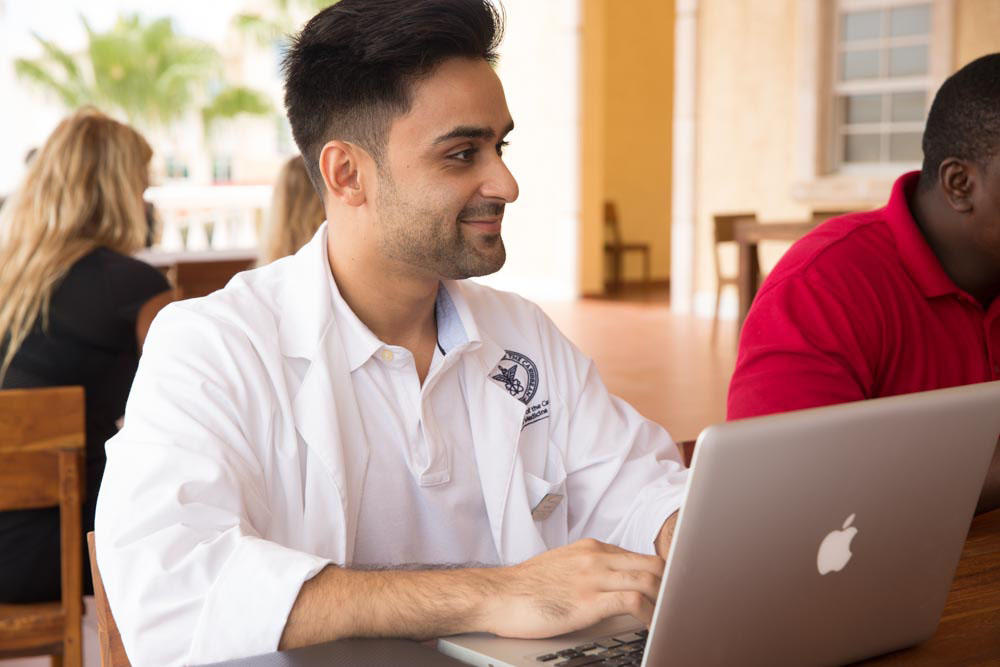Starting medical school is a dream come true for many students. But, studying in medical school is no walk in the park. Having some trusted and well-known study strategies at your disposal can make you feel confident as a medical student and more prepared on test day.
How to Succeed in Medical School
If you’re wondering how to study for medical school efficiently, or you think your current medical school study techniques could use a tune-up, read these tips to help you on your way.
1. Manage your time outside of class
Managing your time is essential when considering how to study for medical school. Although it may seem like there aren’t enough hours in the day to accomplish all of your study goals, taking it day-by-day and establishing a routine will help secure your success. By prioritizing your tasks, planning ahead and taking breaks, you can be more confident and more effective as a medical student.
One of the good medical school study strategies is to thoroughly prepare before class even begins. American University of the Caribbean School of Medicine (AUC) alumnus, Luis Suarez, class of 2021, adopted pre-class reading as one of his medical school study habits. Pre-reading lecture material before class can help you better grasp the organization of the lecture and focus on the most important concepts. In addition, you’ll be prepared to ask questions and participate in a way that demonstrates interest and mastery of the material. This strategy may help you to better learn the material, and will hopefully save you some valuable time.
2. Remember the importance of notes
Everyone knows that you should take notes during lectures, but do you also take notes while reading? One of medical school’s challenges is that it throws a huge amount of information at you over a short period of time. A key to mastering the material is to organize it properly, noting the most important information as you absorb it. This will help you learn the information as you record it and the notes will prove valuable for review as a study guide.
Taking notes can also help you understand complex material. Writing things down in your own words—effectively explaining it to yourself—may help you understand a subject or idea that has been troubling you.
3. Drill until you make it
You may have been able to get through undergraduate courses by cramming for exams, but that is not among our medical school study tips—cramming is a recipe for failure. There is too much material to learn in a med school curriculum, and too much memorization. You need to make your learning continuous, make testing yourself routine, and revisit material regularly. Otherwise, when it comes time for the exam weeks later, you may well have forgotten critical information.
Be sure to collect “clinical pearls”—items and information that are significant, relatively short, and easy to remember. Doctors use such pearls in their own continuing education. Being a doctor means a commitment to lifelong learning, so building daily learning habits while still in medical school puts you on the right path for your future career.
It’s easy to think you understand the material, but testing yourself can help you identify areas where you’re shaky. Take advantage of any study materials and use review questions to develop flash cards. Flash cards provide cheap, convenient, and effective memory aids. Everyone could use an effective memory tool when there is so much to learn and remember.
4. Use every memory trick in the book
Another study tip for medical school is the use of mnemonic devices. These devices include various strategies to memorize information. For example, you might use the acronym FAST to remember that the signs of a stroke are Face, Arms, Speech, and Time. Doctors have so many of these acronyms that it sometimes sounds as if they are talking in code!
Physicians also use memorization phrases to retain information. For example, WANT My Hotdog can help you remember what passes through the placenta: Waste, Antibodies, Nutrients, and Teratogen–and (with some mnemonic liberty) Microorganisms, Hormones, and Drugs.
Another common trick is setting information to music, especially catchy tunes that get stuck in your head. The catchier the song the better, because an irresistible refrain can help you remember a lot of important information.
5. Know your study sweet zone
We all have different strengths when it comes to learning. Some of us are naturally suited to learn by lecture, while others do better with the written word. By now, you probably have a good idea of where your strengths lie. Adopt study methods that play to those strengths.
If you learn best by listening, ask if you can record lectures for later review over headphones. If you learn visually, look for opportunities to sketch, such as with diagrams of organ systems. The very act of drawing and labeling a diagram is a great aid to memory. Overall, the best way to study in medical school is the way that works best for you.
6. Defend your study palace
One of the most important tips for medical school is to have your own “study palace”—a space you control, free of distractions. You can pretend to concentrate anywhere, anytime, but this isn’t realistic. Create a designated study space that encourages concentration—your tranquil palace—and return to it daily. For some students, that place is a private room at home, for others it is a library cubicle. Wherever it is, start with eliminating or at least minimizing electronic distractions.
7. Don’t be afraid to ask for your help
If you find yourself struggling with one area of study in particular, do not be afraid to look for help.
A fellow student may offer solutions, or you may turn to an instructor, especially if you feel confused. Don’t be too proud or shy to approach a professor with questions when the material is unclear to you. Usually, instructors are happy to explain further. Instructors are well suited to provide you with study techniques for medical school - they’ve been there before. You may be surprised by how many other students are also asking for help. Students often struggle with the same material, precisely because it’s difficult.
Another great study technique for medical school courses is to meet with your professors after each exam. You’ll get to know your professor better, gain a deeper understanding of the medical school class requirements, and learn from any mistakes you made.
Luis from AUC used this trick to his advantage: “It made a huge difference to know where I could improve. After an exam, I would meet with the professors to see where I went wrong and get clarification on concepts.”
8. Buddy up
The friendships you make in medical school can last a lifetime. Studying in medical school is intense, and only those who have been there can really understand. Your fellow students can help you study and provide camaraderie, insight, and moral support. With the right crew, you are stronger together than apart.
Meeting up with classmates to go over course material can keep you accountable. Plus, teaching others is a proven learning strategy for medical students to enhance your own understanding of a concept.
During his time in medical sciences at AUC, Luis formed a study group with three other students who met up weekly for five semesters. “We taught and helped each other; in turn, it helped us to understand and remember things well,” Luis said. “It was a fun group, and we enjoyed our group study schedules. It changed our mindset from ‘I have to study’ to ‘I want to study.’”
9. Get quality sleep
Pulling an all-nighter to study at the last minute is only going to hurt you in the long run. Your brain needs sleep to retain all the information you’re reviewing. Getting enough sleep each night and keeping a fairly regular schedule is vital to feeling and performing your best.
10. Stay encouraged
You may be accustomed to school success coming easily, but medical school challenges even the brightest students. No matter how challenging the courses, don’t give up. Remember why you started this journey in the first place!
Now that you know how to study in med school, you should feel much more confident about staying the course. Take a look at the AUC medical sciences curriculum and think about how you’ll prepare for classes. And when you’re ready, apply for admission to AUC and begin your journey to becoming a physician!
Related Resources:





